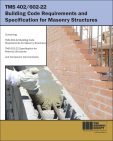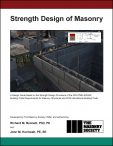Masonry Night School sessions provide comprehensive reviews of a variety of masonry topics including strength design of masonry, allowable stress design of masonry, existing masonry, and more. Each webinar provides 1 hour of continuing education and most are eligible for AIA Learning Units.
Previously recorded series are available through the Masonry Education Hub.
Night School Series Recordings
- Allowable Stress Design of Masonry (6 sessions)
- Existing Masonry – Assessment, Maintenance, and Repair of Transitional Masonry Structures: 1880 to 1945 (7 sessions)
- Masonry 101 (6 sessions)
- Strength Design of Masonry (6 sessions)
- TMS 402/602-22: Review of the New Standards and Changes Made (5 sessions)
View these and other series on the Masonry Education Hub
TMS 402/602-22: Review of the New Standards and Changes Made
Originally presented October – November 2022
 Masonry experts and Committee leaders review the new standards TMS 402-22 Building Code Requirements for Masonry Structures and TMS 602 Specification for Masonry Structures and changes made since the 2016 edition. These standards will form the basis for masonry design provisions in the 2024 International Building Code and other model building codes and include some major new provisions that include a new appendix on masonry partition walls reinforced with Glass Fiber Reinforced Polymer (GFRP) reinforcement, completely revised anchored and adhered veneer provisions, and enhancements throughout the standards.
Masonry experts and Committee leaders review the new standards TMS 402-22 Building Code Requirements for Masonry Structures and TMS 602 Specification for Masonry Structures and changes made since the 2016 edition. These standards will form the basis for masonry design provisions in the 2024 International Building Code and other model building codes and include some major new provisions that include a new appendix on masonry partition walls reinforced with Glass Fiber Reinforced Polymer (GFRP) reinforcement, completely revised anchored and adhered veneer provisions, and enhancements throughout the standards.
Session 1 – Overview of Changes in TMS 402/602-22 and Review of the Specification for Masonry Structures, Presented by John Chrysler, PE, FTMS
Session 2 – Major Structural Design Changes in TMS 402/602-22, Presented by Richard Bennett, PhD, PE, FTMS, University of Tennessee, Knoxville
Session 3 – Seismic/Limit States Design per TMS 402/602-22, Presented by John Hochwalt, PE, SE, FTMS, KPFF Consulting Engineers
Session 4 – Masonry Veneer Requirement Changes in TMS 402/602-22, A Whole New Chapter, Presented by Brian Trimble, PE, CDT, LEED AP, FASTM, IMI
Session 5 – Using the New Appendix D on Composite Reinforcement in Masonry, Presented by Heather Sustersic, P.E., Colby Company Engineering
Continuing Education Credit: 1 PDH / 0.10 CEU / 1 AIA LU per session
Read more about the code changes reviewed in these courses.
Allowable Stress Design of Masonry Series
Originally presented February – March 2022
This series introduces Allowable Stress Design (ASD) of Masonry, reviews code requirements, and examines designs of common masonry elements including, beams, walls, columns, and pilasters. Presenters discuss design methodology as well as design for flexure, axial loads, and in-plane loads. The series concludes with a review of requirements for reinforcement and connectors and detailing masonry effectively. The Allowable Stress Design of Masonry Series is an excellent way to learn allowable stress design procedures. Viewers should have a basic familiarity with masonry (consistent with content presented in the Masonry 101).
Presented by W. Mark McGinley, Ph.D, PE, FASTM, FTMS, University of Louisville & Scott W. Walkowicz, P.E., Walkowicz Consulting Engineers, LLC
Session 1 – Introduction to Allowable Stress Design of Masonry and Design Methodologies, Presented by W. Mark McGinley
Session 2 – Design of Beams*, Presented by Scott W. Walkowicz
Session 3 – Design of Walls for Axial Load and Out-of-Plane Loads, Presented by W. Mark McGinley
Session 4 – Wall Design for In-Plane Loads & Seismic Detailing*, Presented by Scott W. Walkowicz
Session 5 – Design of Columns and Pilasters & Out of Plane Load Distribution, Presented by W. Mark McGinley
Session 6 – Reinforcement & Connectors*, Presented by Scott W. Walkowicz
Continuing Education Credit: 1 PDH / 0.10 CEU / 1 AIA LU per session*
*Does not qualify for AIA LUs
Read more about the ASD topics presented in this series.
Existing Masonry Series – Assessment, Maintenance, and Repair of Transitional Masonry Structures: 1880 to 1945
Originally presented October-December 2021
The Existing Masonry Series discusses common issues in assessing, maintaining, and where needed, repairing masonry cladding systems constructed in North America between the 1880 and 1945. The series begins with a review of common masonry materials and masonry systems then discusses important aspects of developing a building investigation program. Later sessions discuss approaches for testing, rehabilitating and maintaining existing masonry buildings.
Session 1 – Review of Common Masonry Materials, Presented by Edward Gerns & Rachel Will, Wiss, Janney, Elstner Associates, Inc
Session 2 – Masonry Systems, Presented by Tom Elliott & Brian Trimble, International Masonry Institute
Session 3 – Planning and Conducting a Transitional Masonry Building Investigation, Presented by Peter Babaian, Simpson Gumpertz & Heger, Inc.
Session 4 – Testing and Analysis, Presented by Michael Schuller, Atkinson-Noland & Associates
Session 5 – Rehabilitation Options for Transitional Masonry, Presented by Matthew Farmer, Wiss, Janney, Elstner Associates, Inc.
Session 6 – Implementation of a Rehabilitation Project for Transitional Masonry, Presented by Edward Gerns, Wiss, Janney, Elstner Associates, Inc
Session 7 – Developing a Maintenance Plan for Existing Masonry*, Presented by Casey Williams, Simpson Gumpertz & Heger, Inc.
Continuing Education Credit: 1 PDH / 0.10 CEU / 1 AIA LU per session*
*Does not qualify for AIA LUs
Strength Design of Masonry Series

Originally presented February/March 2021
This series introduces strength design of masonry, reviews code requirements, and examines designs of common masonry elements including, beams, walls, columns, and pilasters. Presenters review design methodology as well as design for flexure, axial loads, and in-plane loads. The series concludes with a review of requirements for reinforcement and connectors and detailing masonry effectively. This series is an excellent way to learn strength design procedures. Those taking these courses should have a basic familiarity with masonry (consistent with content presented in the Masonry 101 Series).
Presented by John Hochwalt, PE, SE, KPFF Consulting Engineers & Richard M. Bennett, PhD., PE, University of Tennessee
Session 1 – Introduction to Strength Design of Masonry and Design Methodologies, Presented by John Hochwalt
Session 2 – Strength Design of Beams, Presented by Richard M. Bennett
Session 3 – Strength Design of Walls for Axial Load and Out-of-Plane Loads, Presented by Richard M. Bennett
Session 4 – Strength Design of Walls for In-Plane Loads & Seismic Detailing, Presented by John Hochwalt
Session 5 – Strength Design of Columns and Pilasters & System Behavior, Presented by John Hochwalt
Session 6 – Strength Design Requirements for Reinforcement & Connectors, Presented by Richard M. Bennett
Continuing Education Credit: 1 PDH / 0.10 CEU / 1 AIA LU per session
Read more about this strength design series.
Masonry 101 Series
Originally presented October/November 2020
TMS began a new Masonry Night School webinar program in 2020 with this Masonry 101 series, which provides a comprehensive introduction to masonry materials and concepts for those who need a fast-track course, especially new designers and specifiers. Masonry 101 is intended as a full series to introduce those new to masonry to essential topics in a developing sequence.
Session 1 – Introduction to Masonry, Presented by W. Mark McGinley, Ph.D, PE, FASTM, FTMS, University of Louisville
Session 2 – Introduction to Masonry Units, Presented by Christine A. Subasic, P.E., LEED AP
Session 3 – Mortar, Presented by Jamie Farny, Director, Building Marketing at the Portland Cement Association
Session 4 – Reinforcement and Anchors, Presented by Richard M. Bennett, Ph.D., P.E., FTMS, University of Tennessee
Session 5 – Grout, Presented by Jamie Farny, Director, Building Marketing at the Portland Cement Association
Session 6 – Masonry Assemblies, Presented by W. Mark McGinley, Ph.D, PE, FASTM, FTMS, University of Louisville
Continuing Education Credit: 1 PDH / 0.10 CEU / 1 AIA LU per session
